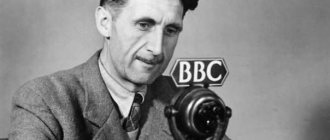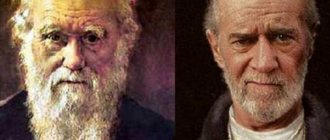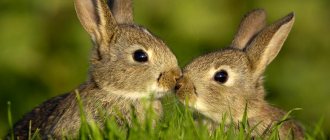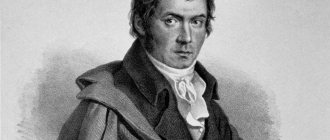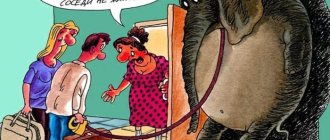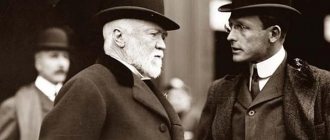Aphorisms and quotes from works of Western literature -
Andersen G. * Asprin R. * Balzac O. - new author * Bach R. * Beaumarchais * Bradbury R. * Valerie P. * Lope de Vega * Verne J. * Garcia Lorca F. * Hasek J. * Heine G. * Goethe I. * Galsworthy D. * Jerome K. Jerome * Druon M. * Dumas A. * Salten F. * Carnegie D. * Castaneda K. * Kipling R. * London D. * Milne A. * Mitchell M. * Moliere * Maupassant G. - new author * Maugham S. * Moorcock M. * Orwell D. * Petrarch F. * Puzo M. * Ripley A. * Rodin O. * Rostand E. - new author * Saint-Exupery A. * Twain M. * Wells G. * Ford G. * Hemingway E. * Zweig S. * Churchill W. * Shakespeare W. * Schiller F. * Shaw B. * Erasmus of Rotterdam * Iacocca L.
Orwell, George (Orwell, George) (real name Eric Arthur Blair - Erik Blair) (1903-1950)
Quotes
- sheet
() () () () () () () () 9 Biography of George Orwell > >
Quotes from George Orwell’s fairy tale “Animal Farm”, November 1943 - February 1944 Translation from English: D. Ivanova, V. Nedoshivin, I. Polotsk, V. Pribylovsky (each quote is given in three translation versions; to which of translators own a version that is closer to the original - it is up to the reader to judge)
It was announced that from now on gun salutes would be fired on Napoleon’s birthday, and not only on the two previously established holidays. Napoleon was never called simply "Napoleon". In official usage they resorted to the following formulation: “our Leader, Comrade Napoleon.” But pigs invented such titles: “Father of all animals”, “Thunderstorm of people”, “Protector of sheep”, “Friend of ducklings” and the like. In his speeches, Screamer liked to refer to the wisdom of Napoleon, to his kind heart, to how passionately the Leader loves all animals, wherever they live, and especially those unfortunate ones who are still in ignorance and slavery on other farms. And at these words, Screamer did not hide the tears rolling down his cheeks. It has become customary to attribute all achievements and successes, simply luck, to Napoleon. It was not uncommon to hear a hen say to her friend: “Under the leadership of our Leader, Comrade Napoleon, I laid five eggs in six days,” or two cows drinking water from a pond confessed: “How tasty the water has become thanks to the leadership of Comrade Napoleon!” » (“Animal Farm”; translation by D. Ivanov, V. Nedoshivin)
It was solemnly announced that now, in addition to the days of traditional celebrations, the revolver will also be used to salute on Napoleon’s birthday. Now he was never spoken of as simply “Napoleon.” When addressing him, it was necessary to use the official title “Our leader, Comrade Napoleon,” and the pigs insisted that others be added to this title - “Father of all animals, terror of mankind, patron of sheep, protector of ducklings” and the like. In his speeches, Squealer, without wiping away the tears rolling down his cheeks, spoke of Napoleon's wisdom, of the deep love that he feels for all animals, especially for the unfortunate ones who are still languishing in slavery and humiliation on other farms. It has become customary to thank Napoleon for every success, for every achievement. One hen could be heard saying to another: “Under the leadership of our leader, Comrade Napoleon, I laid six eggs in five days”; or how two cows, standing at a watering hole, exclaimed: “Thank you to Comrade Napoleon for making the water so tasty under his leadership!” (“Animal Farm”; translation by I. Polotsk)
It was announced that on Napoleon's birthday, as well as on other holidays, a gun salute would be fired. Napoleon was no longer simply referred to as “Napoleon.” His name was now always pronounced according to the established formula: “Our Leader, Comrade Napoleon.” The pigs liked to come up with titles for him like “Father of All Animals”, “Terror of Mankind”, “Patron of Sheepdogs”, “Friend of Ducklings”, etc. In his speeches, Squealer spoke with tears in his eyes about Napoleon's wisdom, the kindness of his heart and the burning love he had for all the animals of the whole world, and especially for the unfortunate animals who still suffer under the yoke of slavery and ignorance on other farms. It became a custom to praise Napoleon for every achievement and every success. You could often hear one heifer say to another: “Under the wise leadership of our Leader, Comrade Napoleon, I laid five eggs in six days,” or two heifers talking while savoring water from a puddle: “How delicious this water is, praise to Comrade Napoleon ! (“Animal Farm”; translation by V. Pribylovsky)
__________
The farm seemed to be getting richer, but the animals weren't getting richer, except, of course, the pigs and dogs. Perhaps this was due to the fact that there were so many pigs and dogs. And the point is not that these animals did not work, they worked in their own way. The screamer tirelessly explained and explained that all the time there is a huge job to do in managing and supervising the work on the farm […] that the pigs have to spend a lot of time every day preparing such mysterious things as “summaries”, “reports”, “ memos" and "protocols". All this was large sheets of paper that had to be written from top to bottom, and as soon as written, burned in the stove. And all this is essential for the prosperity of the farm, said Krikun. And yet neither pigs nor dogs produced any food by their labor, although there were a lot of them and they never complained of appetite. As for the rest of the cattle, life, as far as they could judge, remained the same as always. As always, they were hungry, slept on straw, drank from the pond, worked in the fields, were frozen in winter, and suffered from flies in summer. […] And yet the cattle never lost hope. Moreover, they never ceased - not for a minute - to be proud that they had the honor of belonging to the Animal Farm. After all, this farm was still the only one in the country - in all of England! - a farm run by the animals themselves. […] they knew for sure that they were not like everyone else. And if they starved, it was not because of a human tyrant, and if they toiled at work, then they still worked for themselves. None of them walked on two legs. None of the cattle called any other cattle "Master". All animals were equal. (“Animal Farm”; translation by D. Ivanov, V. Nedoshivin)
At times it began to seem that although the farm was getting richer, this abundance had nothing to do with the animals - except, of course, the pigs and dogs. Perhaps this impression was partly due to the fact that there were many pigs and many dogs on the farm. Of course, they did not shirk their work. They were loaded, as Squealer never tired of explaining, with endless responsibilities for supervising and organizing work on the farm. […] Squealer explained that pigs pore over such mysterious things as “summaries,” “reports,” “minutes,” and “memos” every day. They were large, densely written sheets of paper, and as they were filled, the sheets were burned in the stove. The prosperity of the farm depends on this work, Squealer explained. But still neither pigs nor dogs created any food by their labor; and their vast team has always had an excellent appetite. As for the lifestyle of the others, as far as they knew, they had always lived this way. They experienced constant hunger, they slept on straw, drank from logs and worked in the fields; in winter they suffered from cold, and in summer from gadflies. […] And yet the animals did not abandon hope. Moreover, they never for a moment lost their sense of pride in the honor that was given to them - to be members of a cattle farm. They were still the only farm in the country - in all of England! - Which was owned and led by the animals themselves. […] they understood that they were different from everyone else. If they starved, it was not because they fed human tyrants; if hard work awaited them, then, in the end, they worked for themselves. None of them walked on two legs. Nobody knew what “Master” sounds like! Everyone was equal. (“Animal Farm”; translation by I. Polotsk)
Somehow it turned out that the farm became richer, without making the animals themselves any happier - with the exception, of course, of the pigs and dogs. Maybe this happened partly because there were too many pigs and dogs. It's not like these creatures are sitting idle. As Squealer never tired of explaining, organization, accounting and control did not leave the pigs a moment's peace. […] Squealer said that pigs are forced to expend incredible effort every day on mysterious “plans” and “reports”, “summaries”, “minutes” and “memoranda”. They were large sheets of paper that had to be written as thickly as possible, after which they were usually burned in a furnace. Squealer said that this work was of the utmost importance to the welfare of the farm. It is possible that this was so, but, in any case, neither pigs nor dogs produced any food by their own labor, and there were many of them, and they never suffered from lack of appetite. As for the rest, their lives went on as always. Usually they endured the pangs of hunger, slept on straw, drank water from puddles, worked in the fields, suffered from cold in winter, and from flies in summer. […] And yet the animals never gave up hope. Moreover, they were proud to be citizens of Beast Farm, aware of this as their privilege, and did not lose this consciousness for a moment. They were the only farm in the country - in all of England! - which belonged to animals and was controlled by the animals themselves. […] they realized that they were not like everyone else. If they are starving, it is not because they contain two-legged tyrants. Even if their work is hard, they ultimately work for themselves. None of them walk on their hind legs. No animal calls another animal "master". All animals are equal. (“Animal Farm”; translation by V. Pribylovsky)
__________
A long line of pigs came out of the door of the manor's house, all of them walking on their hind legs. […] And then, amid the loud barking of dogs […] Napoleon himself came out - majestic, straight, like a column. Surrounded by wildly jumping dogs, he looked arrogantly from side to side. Napoleon held a whip in his cloven hoof. There was dead silence. The startled, frightened animals huddled together and watched the long line of pigs marching through the yard. It seemed like the world had turned upside down. […] Without saying a word, Grass gently pulled Benjamin by the mane and led him to the end wall of the large barn, on which the Seven Commandments were written. For a minute or two they silently looked at the white letters on the tarred wall. “My vision is failing me,” Grass finally said. “Even when I was young, I couldn’t always read what was written here.” But it seems to me that the wall looks different now. Tell me, Benjamin, are the Seven Commandments the same as before? This time Benjamin deviated from his principles and read to Travka everything that was on the wall. However, there was nothing there now except one single commandment. It read: All animals are equal, but some animals are more equal than others.
.
After this, no one was surprised that the next day all the pigs supervising the work on the farm walked around with whips in their hooves. (“Animal Farm”; translation by D. Ivanov, V. Nedoshivin)
A line of pigs came out of the farm door - all on their hind legs. […] And finally a dog barked […], which announced the appearance of Napoleon himself. Looking around haughtily, he walked majestically through the yard, surrounded by dogs. He had a whip clamped between his hooves. There was dead silence. Confused and frightened, the animals huddled together and watched as a line of pigs slowly moved through the yard. It seemed as if the world had turned upside down. […] Without saying a word, Clover gently pulled Benjamin by the mane and led him to the wall of the large barn on which the Seven Commandments were written. A couple of minutes later they were already standing at the wall with white letters on it. “My vision is weakening,” she said finally. “But even when I was young, I still couldn’t read what was written here.” But it seems to me that the wall has changed somewhat. Have the seven commandments changed, Benjamin? For the only time, Benjamin agreed to break his rules and read to her what was written on the wall. Everything was as before - except for one commandment. It read: All animals are equal. But some animals are more equal than others. After this, it no longer seemed strange when the next day the pigs supervising the work on the farm acquired whips. (“Animal Farm”; translation by I. Polotsk)
A long line of pigs came out of the door of the apartment building, all on their hind legs. […] And finally, under the terrifying barking of the dogs […] with a majestic upright posture, casting arrogant glances around, Napoleon himself came out with the dogs galloping around him. He carried a whip with him. Dead silence reigned. Amazed, frightened, huddled together, the animals looked at the long line of pigs that were slowly walking along the perimeter of the yard. It seemed like the whole world had turned upside down. […] Without saying a word, Kashka carefully pulled Benjamin by the mane and led him through the back to the end wall of the large threshing floor, where the SEVEN COMMANDMENTS were inscribed. They stood for two minutes, peering at the letters, white against the background of the black, tarred wall. “I can’t see well now,” Kashka finally said. - True, even in my youth I could never make out what was written there. But it seems to me that the wall looks somehow different than before. Benjamin, the Seven Commandments have not changed? For the first time, Benjamin deviated from his rules. He read aloud everything that was written on the wall. Now there was one single commandment: ALL ANIMALS ARE EQUAL, BUT SOME ARE MORE EQUAL THAN OTHERS. After this, it no longer seemed strange to anyone when the next day the pigs supervising the field work all brought whips with them. (“Animal Farm”; translation by V. Pribylovsky)
All animals are equal. "Animal Farm" by George Orwell.
Writer and society. The huge problem is that the writer is trying to influence society, but in reality, society creates the writer for itself. Critics of totalitarianism turn out to be not so free. Interested persons of history take possession of their pen. And the singer of freedom becomes the conductor of a new world order. George Orwell the Prophet. Critic of the USSR. The founder of the genre. The king of the grotesque, bitterness and irony.
During his lifetime, he became a legend, predicting our present and his future in his novels. British writer George Orwell made his surname a household name. “Well, this is pure Orwell,” publicists and politicians say when they want to say that this or that feature of modern politics and society embodies the novels of the futurist writer, full of sarcasm and irony, grotesque and black humor. He died in 1950, almost 70 years ago, and will be exactly 70 in January 2021.
What is this, Orwell’s legendary story “Animal Farm”, what is it about? To put it simply, it’s a grotesque or a parody, whatever anyone wants to call it, of a totalitarian society.
The most famous quote from there is “All animals are equal, but some animals are more equal than others.” But is the story limited only to sarcasm and grotesquery? The attentive reader will see the tragedy behind the top layer. After all, the story - Orwell's parable - is a bitter motif that emerges through a parodic and grotesque drawing. And the tragedy here is the collapse of the hopes of revolutions. The harsh truth, which only historians and political scientists have previously written about, is that not a single revolution has fulfilled what it promised, and for which its ascetics gave their lives. Yes, many writers also talked about this and warned humanity that the revolutionary desire to create a new society often leads to unpredictable consequences. But only Orwell spoke about it so sharply, ironically and bitterly.
The story was published in 1936. The author himself did not hide the fact that by publishing it, he solved two problems - debunking the myth about the wonderful Soviet system. And an attempt to write artistic, essentially journalistic political prose. In his time this was innovation.
Did he do well in trying to drown in the exaggerated grotesque of bitter truth, as if under a microscope, the only attempt of humanity to build a society of equality and brotherhood? Yes, the attempt was unsuccessful, but thank you very much for trying. And why was it a success? Yes, there were hundreds of thousands of victims. And if you include wars in them, then millions. But what is wrong with the very idea of social society? The performers are to blame. Bitterly - yes. It’s a pity for the USSR – very much! And I believe that there will be more attempts. But should we blame Orwell? No. He is an outside critic. And when we start building communism again, we don't need to give future Orwells a reason to write future Animal Farms.
